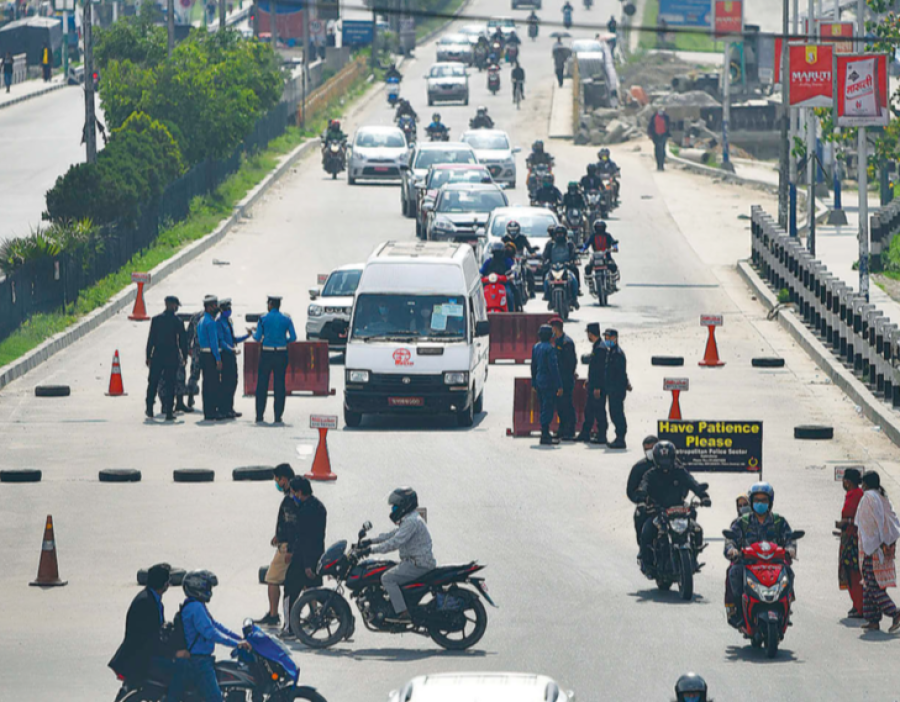Money
Entrepreneurs complain the timecard system is hindering their businesses
The scheme has led to delays and losses due to lack of clarity and coordination, they say.
Krishana Prasain
The timecard system launched by the government in a move to loosen lockdown restrictions and ease the economy forward has prompted complaints from dairy, vegetable and delivery businesses for hindering operations.
The scheme, which permits vehicles belonging to specific sectors on the roads only in their allotted time slots, has led to delays and losses due to lack of clarity and coordination between government agencies, they say.
Dairy owners say their delivery vans are being stopped by the traffic police even though the government has allowed the transportation of essential items. Long delays result in spoilt milk and huge losses, they say.
Prahlad Dahal, general secretary of the Nepal Dairy Association, said that milk vans had been stopped for more than two hours, making workers disinclined to come to work.
The government has allowed industries to reopen, but it has not removed restrictions on transportation, Dahal said. The dairy sector has incurred losses totalling Rs3 billion so far due to the lockdown, and there are unsold stocks of powder milk and butter worth Rs10 billion, he added.
Dahal said he had communicated their problems to officials of the Ministry of Industry, Commerce and Supplies and the Department of Livestock but has not heard anything from them.
Manohar Adhikari, founder of food delivery service Foodmandu, said that the company’s four delivery vans were stopped at Thamel on Monday while delivering orders.
“Vague decisions and absence of coordination is creating more problems at a time when the government's support is crucial to get economic activities moving again. Authorities do not have a clear policy,” he said.
Delivery services perform a vital role during a pandemic by getting products to homes, which means less people on the streets and thus less risk of virus transmission, he said. "But haphazard decisions made without preparation disrupts the entire delivery chain that connects delivery boys, restaurant workers and consumers," he said.
"Stopping delivery vehicles does not make sense when a massive number of private automobiles have been allowed to ply the roads. This shows poor leadership on the part of the government and an inept bureaucracy,” he said.
“We were delivering food by motorcycle before, but now we are using four-wheelers which has increased our costs sixfold, forcing us to operate at a loss,” Adhikari said.
"The lockdown has lasted for more than one and a half months, which means the government had plenty of time to do homework and prepare a proper plan to make gradual improvements in the economy," he said.
Anil Basnet, co-founder of Metrotarkari which makes home deliveries of fresh vegetables, said that the company vehicle which had gone to pick up vegetables from a farm in Bhaktapur got pulled over by the traffic police.
Basnet said that the appropriate time for delivering vegetables was 10 am to 5 pm, but this time slot has not been allotted to them. When delivery is held up, there are chances of vegetables rotting. “I have had to throw away fresh produce as they could not be delivered on time and went bad,” he said.
“The government says that vehicles carrying vegetables are allowed on the roads, but the traffic police do not permit us to move,” he said.
Samartha Dhungana, owner of Dhungana Agriculture Product, Bharatpur, said that his two vehicles that were returning after delivering a shipment of vegetables to Kalimati and Balkhu were stopped by the traffic police. Delays cause vegetables like tomato, beans and cauliflower to lose their freshness.
Vegetables coming from India are allowed unhindered entrance while hurdles are put in the way of local products, he said. The government has never supported vegetable farmers, and this is shown by the practice of stopping vehicles transporting fresh produce, he said.




 18.12°C Kathmandu
18.12°C Kathmandu













